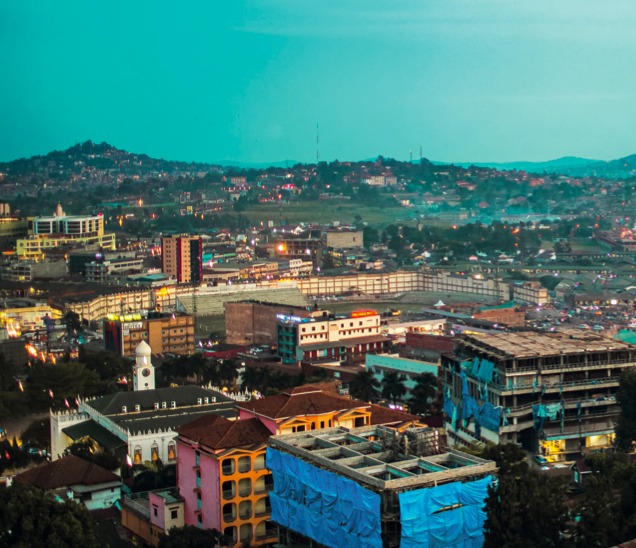We speak with Moses Banduga, Executive Director of GEO-MIK, about growing up as an underprivileged child in Africa and launching a business there.
Please introduce us to GEO-MIK Consultants Africa Ltd. What is the company’s history and mission?
GEO-MIK is an integrated, innovative and multi-disciplinary development consultancy company based in Uganda. Started from
a garage, GEO-MIK has emerged as a fully-fledged innovative and integrated brand in Uganda with a competitive regional and international focus.
The company specialises in geo-information services, remote sensing and earth observation, natural resource assessment, spatial planning, land degradation and productivity monitoring, ecosystem mapping, air born surveys, feasibility studies, baseline surveys and hazard risk assessment. Anchored by a five-year strategic plan, the company is focused on offering quality and cost-effective services while adapting to the changing technology and emerging complex and dynamic business needs of the 21st Century.
GEO-MIKs mission is to appropriately and effectively deliver cutting-edge geo-information technology, land and spatial development solutions that meet the multiple goals and objectives of our clients inspired by our vision to become an international pillar and hub for geo-information technology, land and spatial development solutions in Africa.
The history of GEO-MIK is the typical story of any small startup in Africa. The beginnings, initial operations and development stages were an uphill task for several reasons including access to capital and credit. I also needed to defeat a common stereotype - that you can never start and succeed with your idea or any business venture unless you are from a privileged family, supported by the government or have powerful connections. Later, I realised it is never essentially so. I needed to start anyhow. Along its growth path, the firm closed and reopened several times between October 2008 and 2009 until, January 2010 when it re-established at the “garage” in Namirembe, Kampala. Inspired by the vision, immediately, there was a need to document, incubate and innovate the initial business concepts, craft content, originate templates, scope service and product portfolios.
After competitively securing the first, second and third
government tenders in 2010, 2011 and 2012, things started to look up slowly. We moved operations to a more spacious office in 2013 and later in 2015 because there was a growing need to progressively upscale and restructure our operational capacity. Six years later, propelled by the quest to reinforce and consolidate effectively GEO-MIKʼs growth and reposition our business for the regional and international agenda, it became necessary to relocate our office to the city of Entebbe, so we can be close to the Entebbe International Airport. This also demanded to upscale and add holistic value to the business - to evolve GEO-MIK from a firm to a limited liability company and to realign our product and service portfolios to the emerging domestic and foreign markets. For over a decade now, GEO-MIK has seen sustained domestic growth and has expanded its territorial footprint from project work to 15 countries in Africa, including Uganda, Comoros, Djibouti, Eritrea, Ethiopia, Madagascar, Kenya, Seychelles, Mauritius, Rwanda, Somalia, South Sudan, Sudan, Tanzania and Côte dʼIvoire.
Tell us about your background and the key events that shaped you.
Over 40 decades ago, my parents found their way from the original ancestral District of Arua, currently Maracha to the Southwestern District of Hoima, where I was born. Growing up as an underprivileged child to parents with no formal employment was bound to directly affect my early childhood opportunities, especially education and other necessities of life. Despite the currently existing free government education, at our time, the program was only rolled a year after our lot left primary school and so was with the free secondary education years later. This meant paying tuition to attain education at all levels. Enrolling in 1988, I trekked barefooted about 3 to 5km every day to a local nursery and primary school
at Duhaga from where I completed primary level in 1996 albeit the hardships. I progressed to secondary school the following year. My earlier fears of affording education started to manifest at this level as I was always in and out of class and at some point even dropped out due to lack of tuition. With no other option, I resorted to all sorts of work - casual labourer on construction sites, artisanal work, bricklaying and occasionally offering support at my motherʼs business.
After missing a whole term, I shifted schools when a sports scholarship opportunity showed up at Mandela Secondary School. It was a milestone and a relief to my parents. Aware of my underprivileged life, I always craved to deliver on the sports scholarship since it was also a pathway to further my education. I did everything on the pitch to safeguard it while working hard academically too. My efforts paid off, as I excelled with a Division I during the national final examination in 2000, securing the opportunity again and enrolling for advanced level in 2001 on an academic and sports scholarship.
These two years were always eventful - the scholarship was competitive, and one needed to earn it. But my hard work was rewarded in the end - I was honoured as the overall best-performing prefect for that year. As if that was not enough, my results in the final year sitting of Advanced National Examinations were outstanding and I was recognised by a National Newspaper as one of the top students in the entire district of Hoima.
This was so exciting to me! These successes paired with the fact that I was heading to Makerere University alone made me believe that I was done with poverty. But life at university was very challenging too - I had to become even more focused, resilient, industrious and ambitious as well. But I wasnʼt going to give up. I graduated in 2007, excelling at the top of my cohort.
What inspired your motivation to venture into the World of entrepreneurship?
The precarious events surrounding my upbringing naturally configured an entrepreneurial expedition in me. At a tender age, I had tried all sorts of income-generating endeavours. Although my mother had no formal education herself, she always encouraged us to study hard and also help at the small store she worked at.
Raised as an underprivileged child, I had this passion within me to reverse the status quo for the better. This required a high level of commitment, discipline, focus, patience and dreaming big to make it out of the crowd. In January 2003, I enrolled in a short course and learned some entrepreneurial principles through the Youth IT and Entrepreneurship Development program at Duhaga Tele Center just a couple of months before starting university. After that, I read the Rich Dad Poor Dad book by Robert Kiyosaki and it really sparked off the “go-start gear”. I began to plan very clearly what I wanted for my career after campus. In my mind, it was clear that a job would not help me to achieve my ambition. The drive was seemingly too big, as I was visioning beyond Uganda. I just needed to start anyhow, but there were two major barriers. I had no startup capital and no work experience. I needed to find a job and between 2007 and 2010 I worked for other people. On 28 February 2008, however, I registered GEO-MIK.
Along the journey, I realised that to shape and sustain the real world of entrepreneurship, at a personal level, it was essential to make bold tradeoffs and confront competitive career choices - continue my studies and give all of my time to the pursuit of my dream. Ultimately, I relinquished the latter and also called off early opportunities for postgraduate study multiple times.
However, when I reflect on my journey today, I am excited and motivated to see the growth of our work at the forefront of our industry and I donʼt regret a single thing.
What are the core values of GEO-MIK Consultants Africa Ltd?
GEO-MIK has deeply ingrained principles that guide all company actions and activities and are a constant reminder for day-to-day operations. These are Innovativeness, Teamwork, Customer Service, Professionalism and Commitment.
Tell us more about your clients and the market sectors you serve.
We serve diverse markets ranging from environment, agriculture, mining and exploration, oil and gas, forestry, urban, rural and regional development, utility/ infrastructure, academia and research. Our clients fall into the following categories: Government and Intergovernmental Organisations, CSOs, Donors and Development Partners, Un Agencies, Regional and Continental Bodies, Private Sector, Academic and other Research Institutions and to these, we offer a range of specialised services and products:
• Remote Sensing (RS): Deploying specialised geospatial solutions, satellite image data analysis and processing.
• Geographical Information System (GIS): Utilising information and spatial data obtained from a variety of sources for appropriate and diverse GIS solutions and applications.
• Training, Research and Capacity Development: Offering GIS/RS training, research and capacity development.
• Optical Satellite Imagery: Providing satellite data for commercial satellite sensors through partnerships, derivative products and making extensive use of the satellite data capabilities for a range of solutions and products.
• Geospatial Tools for Agriculture: Providing geospatial and remote sensing data, solutions, products and insights into agriculture development and precision farming.
• Spatial Development Planning: We conduct urban, rural, national and regional development planning, natural resource and resettlement action planning, infrastructure and utility planning, land use appraisal and sector policy analysis.
What are some of the industry’s key challenges?
For the past 10 years, the geoinformation (GI) industry and the market have experienced an upward trend towards the right trajectory both in Uganda and across the region. There are still existing gaps and barriers, though, despite numerous supporting efforts from governments to organise the industry through initial complementary policy interventions. The Geospatial Knowledge Infrastructure Index 2022, for example, also recognises that globally, National geospatial agencies face considerable challenges in meeting the evolving demands of the diverse user ecosystem, including refining large amounts of raw data, data maintenance, competition, funding, etc.
Then, there are technical barriers such as the absence of relevant GI infrastructure (hardware, software, etc.), interoperability, the lack of coordination and classification schemes, information access, maintainability, communication, internet connectivity, lack of data on public sector users needs, status, trend and uptake and general lack of technical knowledge and capacities across the industry.
The buyer/user needs affordable and unincumbered access to reliable and accurate GI, which in most scenarios is not the case. Efforts are needed to facilitate the sharing of available GI, publicising the existence of data and making it easily accessible but also eliminating barriers related to access, utilisation and dissemination. Cultivating intersectoral coordination in different mandated agencies handling GI is important too. We see duplication of efforts as several institutions across the divide repetitively collect and build the same datasets and this does not reach user groups - especially those who are looking for the data in formats that are useable for decision-making with ease.
In addition, with the fast-paced GI industry, customers are finding it hard to adapt to market shifts and cope with emerging GI tools and approaches as existing ones become obsolete. Every single day, new data is created and thus rendering older data inadequate for todayʼs decisions and solutions. While more open-source GI tools have emerged and are freely available on the internet, depending on the scale of work, issues of resolution and validity will have a bearing on derived products and services.
And what about the opportunities?
There is immense opportunity in policy and legislation that mainstreams technological innovation, integrates geoinformation and develops policy guidelines that recognise geoinformation as an important asset for national development. This is in line with the Geospatial Knowledge Infrastructure (GKI) Readiness Index - 2022 which advocates for different governments to create an integrated policy framework to ensure that their nations establish the environment for a digital economy and society that utilises location.
It is essential to optimise and cultivate sustainable strategies and plans for the uptake of available and emerging GI and resources. For example, Uganda launched PearlAfrica Sat- 1 Satellite recently. How is the industry going to optimise the data resources to inform different decision-making processes? Therefore, we will need investment in the underlying physical and institutional infrastructure necessary for the enhancement of the technical capacities of staff and mandated institutions handling GI.
I want to think that the private sector also could get organised to harness and optimise the existing and emerging opportunities in the industry because the private sector is a key strategic ally and driver of innovation and at the same time they produce data, consume or are end users themselves.
The improvement and growing investment in ICT by the government cannot be underestimated across the region. Uganda has seen increased internet users growing to millions as well as internet penetration rates. This is good because data and internet access are critical components and enablers of effective GI utilisation and growth.
In addition, the market and industry as a whole need to take advantage of the shift and digital transition across the industry to scale operational efficiency. Because the commercial GI and satellite industry has revolutionised the science of data acquisition and delivery to the end user and enabled access and utilisation of GI within the same platforms seamlessly and at affordable cost.
What does the East Africa Regional Integration mean to you and the industry as a whole?
The establishment of the community through the East Africa Community (EAC) Treaty of 2000 was a huge opportunity for the industry and trade in the block generally. Although full integration is still not yet realised, when one looks at the four pillars of EAC regional integration and achievements so far generally, the spirit behind is to eliminate trade barriers and facilitate the growth of sectors and the industry. It relaxed restrictions on some key factors of production like labour movement within the region and for enterprises, this is significant in bridging the labour and capacity gaps as businesses can attract specialised skills which are non-existing or are not yet developed in the domestic markets. It also reduces the overall cost of labour as a factor of production and hence, boasts production and enterprise profit.
In addition, the integration comes with expansion and opening of new markets within the region. The entry of South Sudan and the Democratic Republic of Congo in the block for example ultimately increased the market size significantly. Relatedly, it provides businesses with a convenient platform and environment for partnership and synergising on mutual areas of benefit in the industry and reaping other non-economic benefits.
The integration is improving domestic market efficiency and enterprise competitiveness as the industry benefits from shared costs of public goods or common infrastructure projects like public transport, energy, and ICT infrastructure.
What are your biggest goals for the future?
The priority for the first 5 to 10 years is to focus on three strategic areas. The first is to deepen and consolidate GEO-MIKʼs domestic and international competitiveness and establish our global footprint in the industry. Secondly, Iʼd like to motivate, empower, and uplift hundreds and thousands of Ugandan and African Youth startups through an Incubation, Entrepreneurship and Technological Innovation Program. The third is to scale up geoinformation technologies to improve Agriculture productivity in Africa and scale to other diverse sectors like oil and gas.











